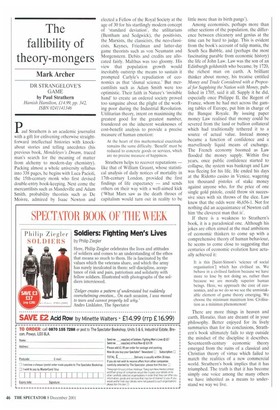The fallibility of theory-mongers
Mark Archer DR STRANGELOVE'S GAME by Paul Strathern Hamish Hamilton, £14.99, pp. 342, ISBN 0241141396 Paul Strathern is an academic journalist with a gift for enlivening otherwise straightforward intellectual histories with knockabout stories and telling anecdotes (his previous book, Mendeleyev's Dream, traced man's search for the meaning of matter from alchemy to modern-day chemistry). Packing almost a whole university syllabus into 338 pages, he begins with Luca Pacioli, the 15th-century monk who first devised double-entry book-keeping. Next come the mercantilists such as Mandeville and Adam Smith, probability theorists such as De Moivre, admired by Isaac Newton and
elected a Fellow of the Royal Society at the age of 30 for his startlingly modern concept of 'standard deviation', the utilitarians (Bentham and Sedgwick), the positivists, the Marxists, the classicists, the neo-classicists, Keynes, Friedman and latter-day game theorists such as von Neumann and Morgenstern. Debits and credits are allocated fairly. Malthus was too gloomy. His view that population growth would inevitably outstrip the means to sustain it prompted Carlyle's repudiation of economics as that 'dismal science.' But mercantilists such as Adam Smith were too optimistic. Their faith in Nature's 'invisible hand' to create an ordered society proved too sanguine about the plight of the working poor during the Industrial Revolution. Utilitarian theory, intent on maximising the greatest good for the greatest number, foundered on the inherent weaknesses of cost-benefit analysis to provide a precise measure of human emotion:
At the heart of this mathematical exactitude remains the same difficulty. 'Benefit' must be reduced to concrete goods or services, which are no precise measure of happiness.
Strathern helps to recover reputations — like that of William Graunt, whose statistical analysis of daily notices of mortality in 17th-century London, provided the first findings of life expectancy — and sends others on their way with a well-aimed kick ('What Marx saw as the death throes of capitalism would turn out in reality to be little more than its birth pangs').
Among economists, perhaps more than other sections of the population, the difference between chicanery and genius at the time can be hard to judge. This is evident from the book's account of tulip mania, the South Sea Bubble, and (perhaps the most fascinating parable from economic history) the life of John Law. Law was the son of an Edinburgh goldsmith who became, by 1720, the richest man on earth. A brilliant thinker about money, his treatise entitled Money and Trade Considered with a Proposal for Supplying the Nation with Money, published in 1705, said it all. Supply it he did, especially once Philippe II, the Regent of France, whom he had met across the gaming tables of Europe, put him in charge of the Banque Royale. By issuing paper money Law realised that money could be severed from the land or bullion collateral which had traditionally tethered it to a source of actual value. Instead money became a function of confidence and a marvellously liquid means of exchange. The French economy boomed as Law flooded the money supply. Within five years, once public confidence started to collapse, the system was bankrupt and Law was fleeing for his life. He ended his days at the Ridotto casino in Venice, wagering ten thousand pistoles of stake money against anyone who, for the price of one single gold pistole, could throw six successive sixes with six throws of the dice. Law knew that the odds were 46,656-1. Not for nothing did an acquaintance of Newton call him 'the cleverest man that is'.
If there is a weakness to Strathern's book, it is a paradoxical one. Although his jokes are often aimed at the mad ambitions of economic thinkers to come up with a comprehensive theory of human behaviour, he seems to come close to suggesting that centuries of economic evolution have actually achieved it: It is this [Saint-Simon's 'science of social organisation'] which has civilised us. We behave in a civilised fashion because we have more to lose by not doing so, rather than because we are morally superior human beings. Here, we approach the core of economics, and as we do so we see the unmistakable element of game theory emerging. We choose the minimum maximum loss. Civilisation as a minimax phenomenon!
There are more things in heaven and earth. Horatio, than are dreamt of in your philosophy. Better enjoyed for its lively summaries than for its conclusions, Strathet-n's book ultimately fails to step outside the mindset of the discipline it describes. Seventeenth-century economic theory emerged from the ruins of a classical and Christian theory of virtue which failed to match the realities of a new commercial world. Strathern's book implies that it has triumphed. The truth is that it has become simply one voice among the many others we have inherited as a means to understand we way we live.






















































































 Previous page
Previous page